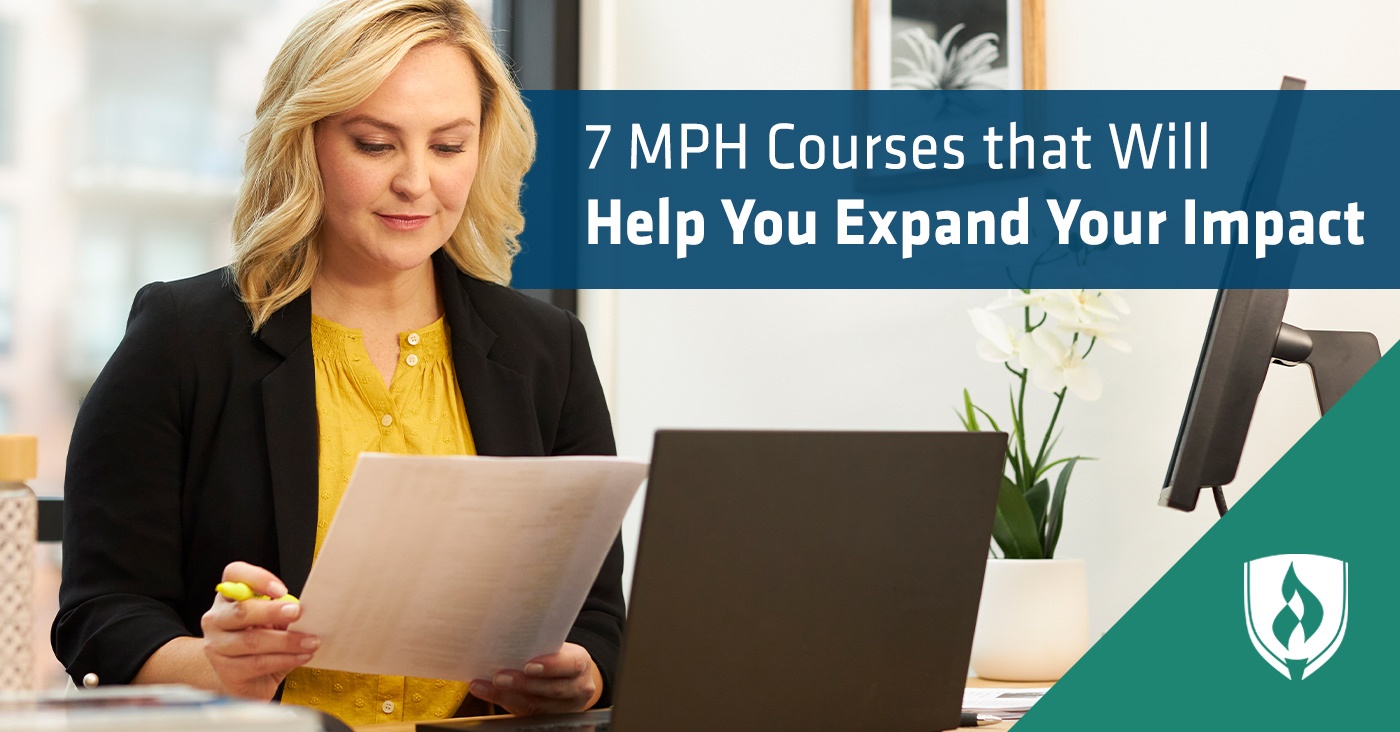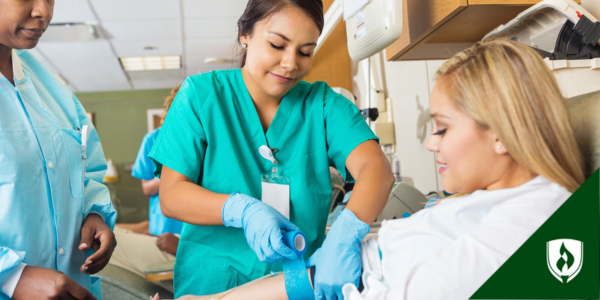7 MPH Courses that Will Help You Expand Your Impact
By Hannah Meinke on 10/19/2020

Living a healthier lifestyle isn’t always simple. For many communities, access to things like clean water, non-polluted air, nutritious food, and safe housing aren’t a given—and that can have a drastic impact on long-term well-being.
If you’re interested in helping to solve some of these big picture issues from a research-based perspective, a Master’s degree in Public Health (MPH) is a great option. Not only does it help prepare you for a wide range of career possibilities, but it can help you make a difference on a larger scale.
To really understand the impact you could have, it can be helpful to explore some specific MPH courses. In this article, we’ll examine the Rasmussen College MPH program as well as some of its key public health courses so you can get a better sense of what’s to come.
Why earn a Master of Public Health from Rasmussen College?
The right MPH program will not only align with your career goals but also with your personal learning style, schedule and budget. That's why the Rasmussen College MPH program was designed with busy professionals like you in mind.
Data-driven courses
Understanding public health issues often requires gathering an enormous amount of data. If you want to better understand how food deserts effect health outcomes in America, for example, you’ll need to know how to leverage technology to your advantage. In the Rasmussen College MPH program, you’ll do just that by using relevant tech to complete your assignments, studying emerging software, and even integrating social media into your studies. Along the way you’ll learn the limitations of data collection and how these factors must be accounted for when drawing conclusions or making policy recommendations.
Social advocacy emphasis
Part of promoting public health means addressing difficult and often controversial topics. Throughout this program, instructors will not shy away from exploring issues such as institutional racism, gun violence, substance abuse, suicide, and more through the lens of a public health practitioner. Rather, they will help facilitate meaningful discussions so you can learn to identify risk factors and communicate them effectively. An emphasis on cultural awareness and sensitivity is crucial to any public health education.
Flexible schedule
Education isn’t the only thing going on in your life right now. That’s one reason the Rasmussen College MPH program is fully online with 100 percent competency-based education (CBE) delivery. This structure enables you to progress through courses at your own pace and can even allow you to complete the program in as few as 21 months of full-time study.1 With four start dates per year, you won’t have to wait long to take the next step in your education.
Leadership focus
In this program, you’ll learn how to lead during a crisis, communicate with diverse teams, collaborate with a variety of public health stakeholders and manage a wide range of responsibilities. By exploring various leadership roles in the field, you’ll be equipped to take on positions in areas such as health informatics, epidemiology, environmental health, risk management, population health and more.
7 MPH courses to expect
While the big picture reasons for considering a Rasmussen College Master of Public Health program might sound good to you, you still want to have a better idea of what’s to come from the coursework—so let’s take a closer look at some of the courses you can expect.
1. Epidemiology for Public Health Professionals
In this course, you’ll learn how the work of epidemiologists influences the work of public health practitioners. Along the way, you’ll develop a deeper understanding of how epidemiological studies are conducted, common sources of data, the strengths and weaknesses of study designs, and how to account for biases or limiting factors in the analysis of a study.
This course will give you the tools needed to navigate the science driving public health policy. This is a valuable asset for researchers, policy makers and practitioners alike.
2. Public Health Leadership
As a public health professional, you’ll need leadership skills to make tough calls and see the bigger picture. This course is designed to help you identify potential mentors and create a leadership development plan. You’ll learn how to manage conflict, address diversity issues, and communicate with various audiences. To develop your leadership style, you’ll explore resources for both personal and professional growth.
3. Environmental Health and Emergency Preparedness
Whether it's a lack of access to safe recreation, nutritious food, or clean air, environmental factors can have a huge impact on the overall health of a community. In this course, you'll learn to develop potential solutions to environmental health issues and also evaluate disaster management strategies. Additionally, you’ll take a deep dive into the environmental laws and regulations that have an impact on global population health.
4. Evidence-Based Public Health Research
Build on your epidemiology knowledge through this public health research course. In this course you’ll develop a thorough understanding of how public health research is conducted, the ethical considerations needed for study designs, the limitations of quantitative and qualitative research methods and more.
This course will hone your analytical skills and features assignments that will put you in the shoes of various public health research stakeholders. Along the way you’ll tackle realistic scenarios like identifying the most effective study design for a particular problem or reviewing research to provide evidence-based recommendations for a health program or initiative.
5. Social Determinants of Health
Explore the role of economic status, education, environment, employment and more on the health of different communities. In this course, you’ll develop strategies that help ensure more people are afforded the opportunity to live healthy lives and how to best mitigate some of the social factors driving negative outcomes. To develop a truly global perspective on health, you’ll examine the impact of bias, cultural competency, and health literacy on wellness outcomes.
6. Master of Public Health Practicum
To better understand the roles of different public health players, you’ll work directly with an organization and complete a project that supports its goals. Whether you're conducting a community needs assessment, evaluating the effectiveness of existing programs, analyzing data or something more, you’ll get crucial, hands-on experience in the field. At the conclusion of the practicum, you’ll reflect on the impact of your project and prepare to advance your career with an in-field application of what you’ve learned.
7. Master of Public Health Capstone
In this capstone, you’ll apply the theory, knowledge, and skills that you learned in your other courses. The values of critical thinking, cultural competency and evidence-based research will guide you through a final project. You’ll select a current public health topic, design an initiative to improve outcomes, create a data analysis plan, and communicate your findings. As in the rest of the program, your goal will be to promote health and disease management in diverse populations.
Earn your Master of Public Health at Rasmussen College
Now that you know more about public health courses, you’re that much closer to actually earning an MPH. It may be challenging at times, but with the right program, you could develop valuable expertise. And more importantly, you could have a bigger impact on the communities you serve with the skills you gain. To explore the next step in this process, visit the Rasmussen College Master of Public Health program page and learn about more of the MPH courses you could be taking.
1Completion time is dependent on the number of courses completed each term.




